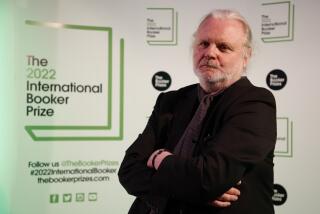Edgar Bowers; Poet Won Bollingen Prize
- Share via
Edgar Bowers, a longtime UC Santa Barbara English professor whose elegantly chiseled verse earned him poetry’s top prize, died of cancer Friday in San Francisco. He was 75.
Bowers wrote five collections of poetry, including “The Form of Loss, “For Louis Pasteur” and “The Astronomers.” In 1989 he was awarded the $10,000 Bollingen Prize from Yale University, considered American poetry’s most prestigious honor. Previous winners included Wallace Stevens, Marianne Moore, E.E. Cummings, Robert Frost and Robert Penn Warren.
Bowers was often called a poet’s poet, a reflection both of his technical excellence and his relative obscurity.
“Edgar wrote very little but it was always perfect,” said Thom Gunn, a San Francisco poet who was on the selection committee for the Bollingen Prize. “He was one of the best poets alive.”
Bowers was one of the few poets of his generation to write metered verse. His tightly controlled poems dealt with profound themes, such as knowledge, beauty and faith.
Joseph Bennett, writing in the New York Times, said Bowers’ poems “demonstrate that quality of high seriousness which has faded from poetry” in the last half-century. Speaking of his compressed, classic style, Bennett added that Bowers could “accomplish more in a single poem than many poets do in a lifetime.”
Bowers was a shy man whose faintly accented speech belied his Georgia roots. Born in Rome, Ga., where his father raised plants in a nursery, he attended the University of North Carolina, but his education was interrupted by World War II. He served in an intelligence unit from 1944 until 1946, concluding his military service in Berchtesgaden, Hitler’s stronghold in the Bavarian Alps.
After the war, he returned to the University of North Carolina, then obtained a doctorate in English at Stanford, where he studied with the eminent poet and critic Yvor Winters.
His wartime experiences affected him deeply. Central themes of death, loss and identity often converged in his poems, such as in these lines from the poem “Autumn Shade,” considered one of his major works:
My image of myself, apart, informed
By many deaths, resists me, and I stay
Almost as I have been, intact, aware,
Alive, though proud and cautious, even afraid.
In addition to the Bollingen Prize, Bowers also was the recipient of two Guggenheim Foundation fellowships and literary honors from the Commonwealth Club of California and the Ingram Merrill Foundation of New York. A specialist in Renaissance and modern poetry, he taught at UC Santa Barbara for 33 years. A lifelong bachelor, he moved to San Francisco after his retirement in 1991.
He was not prolific--almost 20 years separate two of his most recent books, “Living Together” and “For Louis Pasteur.” But he was a perfectionist, colleagues say.
“His output was not great in number, but everything he published was polished within an inch of his life,” said UC Santa Barbara professor Porter Abbott. “It was the most important thing to him, writing a poem.”
More to Read
Sign up for our Book Club newsletter
Get the latest news, events and more from the Los Angeles Times Book Club, and help us get L.A. reading and talking.
You may occasionally receive promotional content from the Los Angeles Times.











